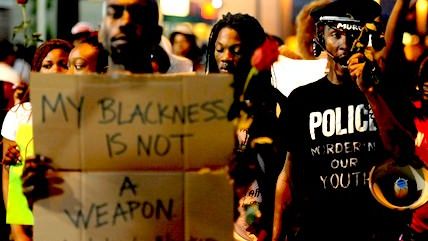Poll: 70% of Americans Oppose Racial Profiling by the Police


Protests in Ferguson continue today over the police shooting of an unarmed black teenager, Michael Brown.
The latest Reason-Rupe poll asked Americans what they thought about a number of issues in the criminal justice system including their perceptions of police abuse, accountability in police departments, and racial bias and injustice.
POLICE POLL RESULTS FOUND HERE
The latest poll finds fully 70 percent of Americans oppose the use of racial profiling in police departments, while 25 percent support this practice. Breaking these numbers down further, 48 percent strongly disapprove, 22 percent somewhat disapprove, while 12 percent somewhat approve and 13 percent strongly approve.
The question was careful to avoid using the actual words racial profiling, but described it as follows: "It has been reported that some police officers stop motorists or pedestrians of certain racial or ethnic groups because the officers believe that these groups are more likely than others to commit certain types of crimes. Do you approve or disapprove of this practice by the police?"
Considerable demographic and even partisan differences emerge on the practice of racial profiling.
While majorities of Democrats, Republicans, and Independents oppose the practice, Democrats are far more likely to oppose with much stronger intensity. Fully 81 percent of Democrats oppose, including 62 percent who strongly oppose; 17 percent support the practice. Seventy-one percent of independents oppose, including 48 percent who strongly oppose; 20 percent approve.
A majority of Republicans are also opposed, but less so than Democrats and Independents, with 55 percent opposed and only 28 percent strongly opposed. Thirty-seven percent of Republicans favor the use of racial profiling including 22 who strongly approve. It should be noted that tea party supporters are not significantly different from regular Republicans who do not support the movement (55 and 59 percent respectively oppose racial profiling, respectively).
Using Reason-Rupe's three-question screen1 to identify political groups, conservatives are the least likely to oppose the use of racial profiling, although a majority still oppose (53%). Libertarians are nearly twenty points more likely than conservatives to oppose police use of racial profiling (69%), and liberals and communitarians are the most likely to oppose the practice, 83 and 79 percent respectively.
White Americans (28%) are nearly twice as likely as African-Americans and Hispanics (14%) to approve of racial profiling by the police. Nevertheless, strong majorities of all racial groups oppose of the practice, 65 percent and 86 percent respectively. In fact, fully 81 percent of African-Americans strongly disapprove of this practice, compared to 62 percent of Hispanics and 40 percent of white Americans.
While all age groups disapprove of racial profiling, older people do so with less intensity. Fifty-three percent of Americans under age 55 strongly disapprove of racial profiling, and 20 percent somewhat disapprove. However, among Americans over 55, only 40 percent strongly disapprove and 26 percent somewhat disapprove.
Many may find it troubling that those who support racial profiling are also the most likely (64%) to believe the criminal justice system in American treats all racial groups equally while 25 percent believe the system gives preferential treatment to white Americans. In contrast, among those who oppose racial profiling, 53 percent believe the system is biased against minorities, and 37 percent believe all are treated equally. Overall, Americans are divided in their perception of actual systematic bias: 44 percent say the criminal justice system treats black and Hispanic Americans less fairly than white Americans. Another 45 percent say the system treats everyone equally under the law. Similar partisan and demographic patterns emerge, but considerably more dramatic.
The Reason-Rupe national telephone poll, executed by Princeton Survey Research Associates International, conducted live interviews with 1004 adults on cell phones (503) and landlines (501) October 1-6, 2014. The poll's margin of error is +/-3.8%. Full poll results can be found here. including poll toplines (pdf) and crosstabs (xls).
Three Question Screen Includes1:
1) Next…as I read the following pairs of statements, please tell me which comes closer to your own opinion. First, we need a strong government to handle today's complex economic problems; OR, people would be better able to handle today's problems within a free market with less government involvement.
2) Some people think the government should promote traditional values in our society. Others think the government should not favor any particular set of values. Which comes closer to your own view?
3) If you had to choose, would you rather have a smaller government providing fewer services, or a larger government providing more services?


Show Comments (2)